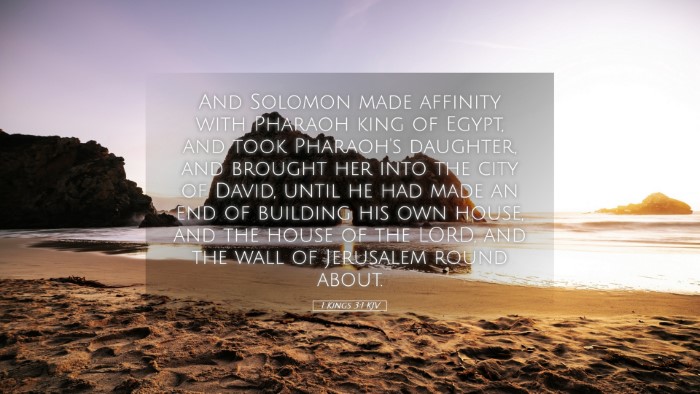1 Kings 3:1 - Commentary Insights
Verse: "And Solomon made affinity with Pharaoh king of Egypt, and took Pharaoh's daughter, and brought her into the city of David, until he had made an end of building his own house, and the house of the Lord, and the wall of Jerusalem round about."
Contextual Background
This verse marks a significant moment in Solomon's reign. It highlights the political alliances formed in ancient times through marriage, which were intended to secure peace and strengthen relations between nations. Solomon's marriage to Pharaoh's daughter is pivotal as it sets the stage for his reign characterized by both wisdom and compromise.
Commentary Insights
Matthew Henry's Commentary
Matthew Henry emphasizes the significance of Solomon's political marriage as a means of establishing connections with Egypt, a major power. Henry points out that while this alliance might have appeared advantageous in a political sense, it laid the groundwork for future spiritual consequences. He notes that Solomon's affection toward foreign alliances could potentially lead to idolatry, which became a recurrent theme in the history of Israel's kings.
Albert Barnes' Notes
Albert Barnes focuses on the reasoning behind Solomon's actions, suggesting that the marriage served not only diplomatic purposes but also reflected Solomon's ambitions. He posits that Solomon's intent to build a great empire included solidifying international relationships. However, Barnes warns that Solomon's integration of foreign customs and peoples into Israel posed risks to the nation's commitment to Yahweh, foreshadowing the spiritual decline that would ensue later in his reign.
Adam Clarke's Commentary
Adam Clarke provides historical context, noting that Pharaoh's daughter represents one of the first significant foreign influences over Israel. Clarke notes that political marriages were common, but he expresses concern over the implications of such unions with foreign nations. He urges readers to consider the spiritual ramifications, explaining that Solomon's later infractions against God’s commandments regarding intermarriage could be traced back to this early decision.
Thematic Applications
- Political Alliances: The verse illustrates the importance of political maneuvering in ancient kingdoms. It encourages modern readers, especially leaders and policymakers, to consider the spiritual and ethical dimensions of alliances and partnerships.
- Wisdom and Folly: Solomon is often celebrated for his wisdom; however, this action reflects a folly that compromises his wisdom. This serves as a reminder for current leaders to ensure their actions align with their values.
- Spiritual Consequences: The commentary underscores the danger of compromising faith for the sake of political advantage, urging believers to remain steadfast in their commitments to God amidst worldly temptations.
Conclusion
This verse invites pastors, students, theologians, and Bible scholars to engage with the complexities of political authority, faith, and the moral responsibilities imbued in leadership. The insights from various public domain commentaries enrich our understanding of Solomon’s actions and their implications, encouraging us to draw lessons about integrity, faithfulness, and the potentially perilous nature of seeking worldly alliances.


